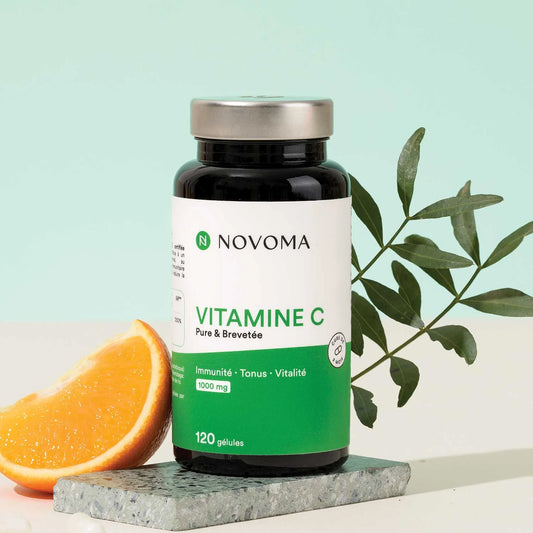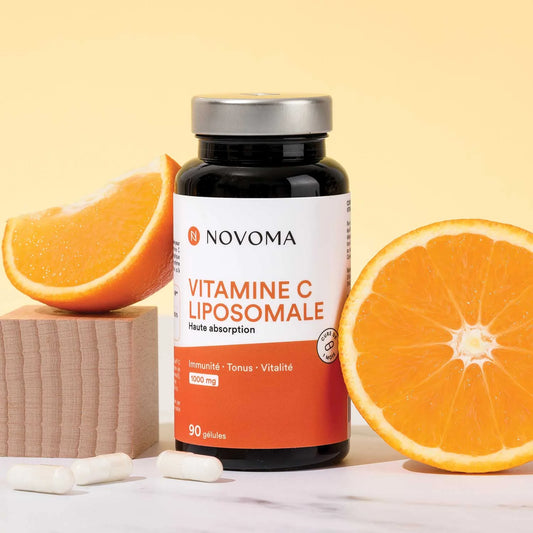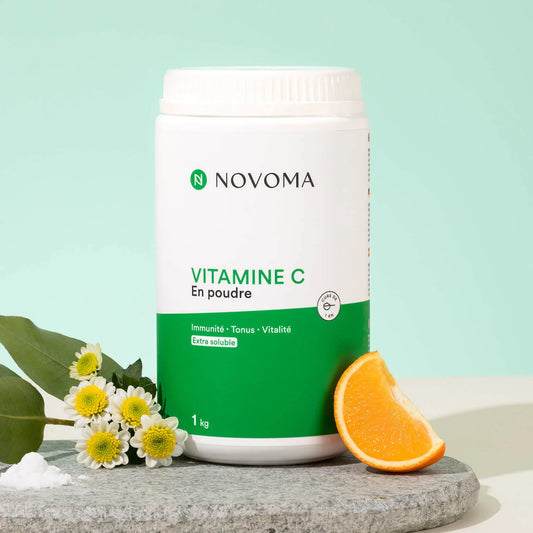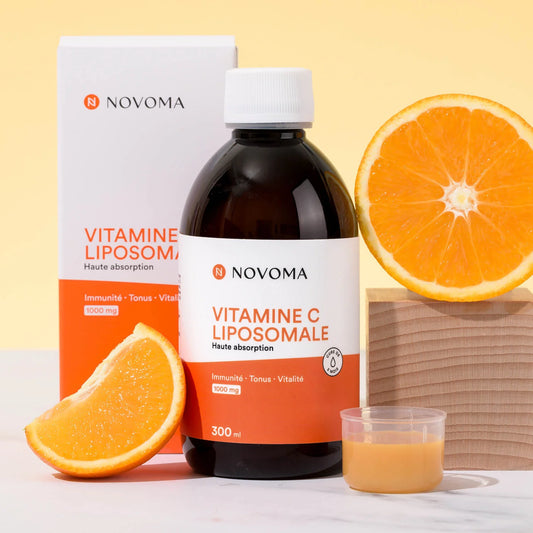
What is the Best Vitamin C? Our Advice and Opinions (2025)
Renowned as THE vitamin for energy and fitness, we have appreciated the benefits of vitamin C for a long time. Existing in different forms, the best vitamin C will contribute to the proper functioning of the human body and its defense, particularly against viruses and bacteria.
Be careful, however: regular consumption is important to avoid a lack of vitamin C, because humans can neither produce it naturally nor store it. ANSES (National Agency for Food, Environmental and Occupational Health Safety) recommends a daily intake of 110 mg for men and women aged 18 and over.
But then, how to select the best vitamin C ?
Overview of the criteria to take into account.

Quick reminder: what is vitamin C?
Vitamin C is undoubtedly the most famous vitamin. It plays a major role by acting as an antioxidant. It strengthens the immune system and prevents certain dysfunctions in the body.
So, vitamin C is our ally. It allows us to fight against stress, but also to better resist external aggressions (pollution, free radicals, sun, tobacco, etc.). Taking vitamin C also promotes the production of collagen , a protein that fights cellular aging.
Note also that it facilitates the absorption of iron and helps reduce fatigue.
If you want to find out more about it, we have a complete guide to vitamin C.
Choosing the best vitamin C: focus on some selection criteria
Vitamin C, also called ascorbic acid , is found in two different forms: natural and synthetic. Depending on your use, your lifestyle, your activities, you will choose one or the other. To determine the best form of vitamin C, the one that will best suit your needs, there are a few selection criteria you should know ⤵️
Natural or synthetic vitamin C?
There are therefore 2 types of vitamin C, ultimately quite simple.
One, natural vitamin C , comes from our diet. Indeed, a balanced and varied diet of fruits and vegetables provides most of the daily intake of vitamin C. It is the best natural vitamin C.
The other, synthesized vitamin C , is born from a chemical reaction obtained in the laboratory. Synthetic vitamin C is called artificial.
But then, what is the best form of vitamin C? Everything will depend on your food consumption and whether or not it induces a lack of vitamin C.
Vitamin C consumption: what is the recommended dosage?
To avoid any lack of vitamin C, as we mentioned above, the minimum daily intake for an adult is around 110 mg , or nearly 500 g of fruits and vegetables per day. All the same ! 🍊
However, in certain specific cases, it is advisable to increase this nutritional intake. Let us cite for example:
- pregnant women: up to 120 mg/day;
- breastfeeding women: 130 to 170 mg;
- elderly people: 120 to 130 mg;
- athletes: up to 1000 mg.
As we can see, athletes greatly need vitamin C! We talk about vitamin C and sport in this article, if you want to know more.
Vitamin C: is there a risk of overdose?
Good news: vitamin C being water-soluble , the surplus is evacuated with the urine. So, little risk of overdose! However, in the event of excessive consumption and/or intestinal fragility, some unpleasant side effects may be observed, such as acceleration of transit.
If necessary, reduce your consumption and space out ascorbic acid intake.
What is the best vitamin C?
Now that you know more about the functions and characteristics of this wonderful nutrient, the key question remains: how to find the best form of vitamin C !
To answer this question, you will first need to determine whether you prefer to consume 100% natural vitamin C or not.
Natural Vitamin C
The best natural vitamin C is found in our diet. Concentrations vary depending on the type of fruit or vegetable. Orange, for example, is known to be rich in vitamin C, but it is not the only one!
In this article, we explain to you where to find the best natural vitamin C. Some plants contain much more than others: this is the case of acerola .

Acerola
This shrub is native to Mexico, South America and Central America. These fruits are rich in nutrients (vitamins, minerals and plant fibers), but also in magnesium, potassium and phosphorus. This is why acerola is very popular as a natural vitamin C supplement.
You will learn in this complete guide dedicated to acerola why it is undoubtedly the best natural vitamin C.
Acerola comes in the form of powder or chewable tablets. Practical, this food supplement can be consumed by the whole family (from 4 years old), at any time of the day.
Acerola can be conventional or from organic farming. Our acerola comes from Brazil, a country suitable for its production, and contains 17% natural vitamin C. Thus, for 1000 mg of acerola, we find 170 mg of vitamin C. For higher intakes, it is interesting to turn to a synthetic vitamin C.
✅ Benefits
Natural vitamin C is water-soluble and above all 100% natural! Its composition naturally improves the assimilation of vitamin C.
⛔ Disadvantages
Acerola is an acidic fruit that can become acidifying if consumed in too large quantities. In the event of an overdose, acerola could cause digestive discomfort. Furthermore, the taste of the tablets is not always appreciated. It is better to turn to neutral tastes and natural aromas. It is not recommended in cases of kidney problems.
👪 For whom?
Acerola can be ingested by all members of the family from 4 years old.
Synthetic Vitamin C
In certain circumstances, even a diet rich in fruits and vegetables may not be enough to correct a lack of vitamin C. It is also possible to take a course of food supplements based on synthetic vitamin C.
Synthetic vitamin C has the same chemical composition as natural vitamin C.
However, we cannot say that even the best synthetic vitamin C is natural, since it comes from a chemical reaction produced in the laboratory. It is called pure vitamin C , unlike the natural vitamin C contained in plants, because it is only composed of… vitamin C! It is found in various forms.

Pure ascorbic acid
The chemical name for synthetic vitamin C is L-ascorbic acid. It is simply a vitamin C that is molecularly identical to natural vitamin C, but produced artificially.
✅ Benefits
Like natural vitamin C, synthetic vitamin C is water soluble. Both have practically the same properties. Synthetic vitamin C is more economical and ultimately more concentrated in vitamin C than natural vitamin C. It is found in different forms: capsule or powder.
⛔ Disadvantages
Due to their acidity, synthetic vitamin C can cause stomach or intestinal discomfort in certain people. It is sometimes necessary to spread out the intake throughout the day and reduce the quantities.
👪 For whom?
Synthetic vitamin C can be ingested by all members of the family from 4 years old.

Liposomal vitamin C
Liposomal vitamin C uses a clever principle of encapsulating vitamin C in small vesicles made of lipids. It then becomes liposoluble, that is to say soluble in fats.
This process considerably increases its effectiveness, because the absorption of vitamin C by the body is then progressive. His concentration remains strong for longer. This form of vitamin C is undoubtedly, currently, the best form of vitamin C 👍
✅ Benefits
Due to the fat contained in liposomal vitamin C, its assimilation by the body is excellent. It does not cause any digestive problems.
⛔ Disadvantages
The price of success, and due to its manufacturing process, the cost of liposomal vitamin C is a little higher.
👪 For whom?
It is particularly recommended for people with fragile intestines. We talk in more detail about liposomal vitamin C in this article .
Ascorbates
In this type of synthetic vitamins, vitamin C is combined with mineral salts such as calcium and magnesium. It is a non-acidic form of vitamin C.
✅ Benefits
The presence of mineral salts promotes the absorption of vitamin C. This formulation offers very good digestive comfort. The presence of mineral salts makes it possible to make up for certain deficiencies such as the lack of magnesium, for example.
⛔ Disadvantages
We advise you to check the mineral salt contents of the food supplement. Indeed, high concentrations of sodium or calcium ascorbate may not be recommended for certain people.
👪 For whom?
Here too, ascorbates are particularly intended for people with fragile intestines.
Ascorbyl palmitate
Ascorbyl palmitate is an organic compound formed from ascorbic and palmitic acids. It is fat soluble.
✅ Benefits
This form of vitamin C prevents stomach acid. It is well tolerated by the body. In addition, its controlled cost makes it relatively accessible.
⛔ Disadvantages
The manufacture of ascorbyl palmitate requires the use of solvents. It should not be confused with liposomal vitamin C, although both are hyposoluble.
👪 For whom?
It is intended for people with fragile intestines.
Vitamin C + bioflavonoids
Bioflavonoids (or flavonoids) are substances present in the skin of fruits or in the white part of citrus fruits. Combined with vitamin C, this makes for a very rich, broad-spectrum combo.
✅ Benefits
Both vitamin C and bioflavonoids are important antioxidants. They are water-soluble and non-toxic, even in large doses.
⛔ Disadvantages
Taking vitamin C and bioflavonoids can cause blood pressure disturbances in people with excessively high blood pressure. It can also cause stomach discomfort in fragile people. So beware!
👪 For whom?
The combination of vitamin C and bioflavonoids is aimed at people wishing to protect their cells from free radicals, but above all, who do not have problems with stomach tension or sensitivity. Vitamin C is also known for its benefits on the skin .
Powder, capsules/tablets or liquid: what is the best vitamin C?
The types and nature of vitamin C are one thing, but there is another important thing to consider when choosing a vitamin C supplement: the form, or packaging. So what is the best form of vitamin C?
A quick summary of the different forms of vitamin C to help you choose the best vitamin C for you.
Vitamin C in capsules or tablets
This is the “classic” oral form of vitamin C (or L-ascorbic acid). A classic treatment of vitamin C in capsules lasts for example 2 months, at a rate of 2 capsules per day.
Vitamin C powder
This is the “classic” oral form of vitamin C (or L-ascorbic acid). It is soluble in water, and thanks to the fineness of its powder, it dissolves instantly. Practical, it is easy to dose according to your needs.
Vitamin C powder is an ideal solution to adapt the quantities to all members of the family.
Liquid vitamin C
For those who have difficulty with capsules or powder, there is a third form of vitamin C: the liquid form . You then simply drink the solution directly or (depending on your preferences), dilute a few milliliters of vitamin C in water, which makes the intake almost “invisible” and completely neutral for the person.
Verdict: What is the best vitamin C?
Before you decide, we recommend in all cases that you carefully look at the composition of the chosen supplement. Check the concentration of the product, its traceability and its good assimilation.
Regarding the shape, there is no absolute truth: the best is to choose according to your preferences and the comfort provided. Here is a small summary table to help you:
| Criteria | |||||
| Product |  |
 |
 |
 |
 |
| Benefits |
- Extra soluble powder - Measuring spoon included - Economic format |
- Quali®-C label - Practical size - Small budget |
- Quali®-C label - High assimilation - Excellent intestinal tolerance |
- Quali®-C label - High assimilation - Practical size |
- Titration of 17% natural Vitamin C - Biological - Sugar free |
| Format | Powder |
Capsules |
Liquid |
Capsules |
Tablets |
|
Bioavailability |
Good |
Good |
Excellent |
Excellent |
Good |
|
Content vitamin C |
Optimal |
Optimal |
Optimal |
Optimal |
Correct |
| Without chemical additives | ✅ |
✅ |
✅ |
✅ |
✅ |
| Daily dose | 1000mg |
1000mg |
1000mg |
1000mg |
170 mg |
| Dosage | 2 spoons |
2 capsules |
5ml |
1 to 3 capsules |
1 tablet |
| Duration of treatment | >1 year |
2 months |
2 months |
1 to 3 months |
1 to 2 months |
| Contraindications | ❌ Not recommended in case of kidney stones |
❌ Not recommended in case of gout and kidney stones |
|||
| Recommended for | The whole family |
||||
To conclude, from our point of view, the best vitamin C is probably liposomal vitamin C.
Whether in capsules or liquid, liposomal vitamin C is extremely well assimilated and tolerated by the body. It also stays longer in the body. As it is very well tolerated, people with a fragile intestine or stomach appreciate it.
Whatever your choice, we hope that you will now have all the cards in hand to choose your next supplement, and therefore, your best vitamin C 🌞




























